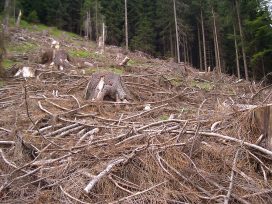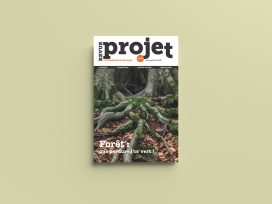
A combination of geopolitics and economic pressure is weakening the political will behind the European Green Deal, with the EPP leading the deregulatory offensive. Forests in particular risk becoming collateral victims of a rightwing U-turn.
Across Europe, forest fires are intensifying year upon year. Climate change, droughts, falling biodiversity and Eucalyptus trees are all factors that fuel the blazes. How can Europe avoid fanning the flames? Tune into this Standard Time Episode to find some answers!
Imagine a map of Luxembourg. Cute, right? If we add up all the wildfires of the EU from 2023, it would cover Luxembourg twice, totalling above five hundred thousand hectares. When this show is published in the autumn of 2024, forest fire season is still in full swing, and trends are only going to get worse in the coming years.
One key player that has to be mentioned when it comes to forest fires is climate change. Yes, it always circles back to climate change. As the global temperature rises, it disrupts the earth’s water cycle. The warmer climate causes more water to evaporate, and the warmer atmosphere holds more water, that leads to more storms and rainfall. As a result, wet areas become wetter and dry areas become drier. Only a small spark is needed to set the drying forests in flames.
In 2023, European wildfires produced 20 megatons of CO2 emissions, as estimated by the European Forest Fire Information System, or EFFI for short. This is nearly as much as a third of all emissions from international aviation in the EU during one year.
This is a flaming closed loop: as climate change causes more droughts and heatwaves, and as a result more fires and blazes, the fires themselves fuel global warming.
Fueling the fire
And speaking of fuel: the low humidity increases the risk of wildfires in places with a lot of litter – both natural and human-made debris are a fire hazard. Scientists call this ‘biomass’ or ‘fuel availability’.
According to the emissions expert Nikolaos Evangeliou : ‘In several countries in Europe, there are large boreal forests where no biomass removal or maintenance have ever been done.’
Evangeliou’s family home in Greece burned down twice. Once in 1992, and again in 1996. Proactively working with the forest, by collecting deadwood and dry biomass every year they ended the loop of fires. They haven’t seen such fires since.
This method mainly works in smaller areas and it’s not feasible on mountainous terrain or on thousands of hectares of natural forest. And not every wood is created equal. Some forests burn easier than others. For example, pines and Eucalyptus trees tend to combust like a box of matches because they are so rich in resin and oils. So please, Portugal, stop planting Eucalyptus trees! Pines also tend to give a hard time to any smaller plants that would form an undergrowth, leaving almost nothing but dead pine-needles full of resin, bursting into flames like they’re paid to do so.
As a rule of thumb, native species and highly complex ecosystems tend to be more resilient than industrial forests. This is an important factor to consider for rewilding projects and tree planting as a measure to combat climate change.
Local circumstances are key, and preventing disasters is always better than mitigating ones that are already happening. And we have just the people to tell us how to do it.
Lieutenant Colonel László Barta-Vámos is the head of Department for Fire Protection, /National Inspectorate General for Fire Services, Deputy-Directorate General for Operations, National Directorate General for Disaster Management in the Ministry of Interior.
Mariangela Paone is an Italian journalist working for el Diario in Spain. Her latest work includes a collaborative Multimedia Article about Forest Fires in Greece, Portugal and Spain. She is also the author of the book ‘The Four Seasons of Athens’.
Multimedia report: https://especiales.eldiario.es/incendios/
Gabor Gremsberger is the CEO and the founder of Climate Action Ltd. He is a qualified lawyer, who completed his legal studies at Utrecht University in the Netherlands as well as the University of Law in Pécs, Hungary. He sees the future of climate protection in collecting and providing data which facilitates the continuous control of climate goals.
Réka Kinga Papp anchor
Daniela Univazo writer-editor
Merve Akyel art director, Eurozine
Szilvia Pintér producer
Priyanka Hutschenreiter project manager
Julia Sobota captions and translations
Zsófia Gabriella Papp digital producer
Management
Judit Csikós finance
Réka Kinga Papp editor-in-chief
Csilla Nagyné Kardos office administration
Video Crew
Voxbox Multimedia Studios in Brussels
Gergely Áron Pápai photography
Postproduction
Nóra Ruszkai video editor
István Nagy lead video editor
Milán Golovics dialogue editor
Art
Victor Maria Lima animation
Crypt-of-Insomnia theme music
Hosted by
The CDU Library, Hungary
Articles
https://www.bbc.com/news/newsbeat-41608281
https://www.wri.org/insights/global-trends-forest-fires
Published 3 October 2024
Original in English
Subscribe to know what’s worth thinking about.

A combination of geopolitics and economic pressure is weakening the political will behind the European Green Deal, with the EPP leading the deregulatory offensive. Forests in particular risk becoming collateral victims of a rightwing U-turn.

Why forest restoration projects are counterproductive; how citizens are mobilizing to protect Europe’s woodland from the right; and why diversity is the solution to sustainable timber.